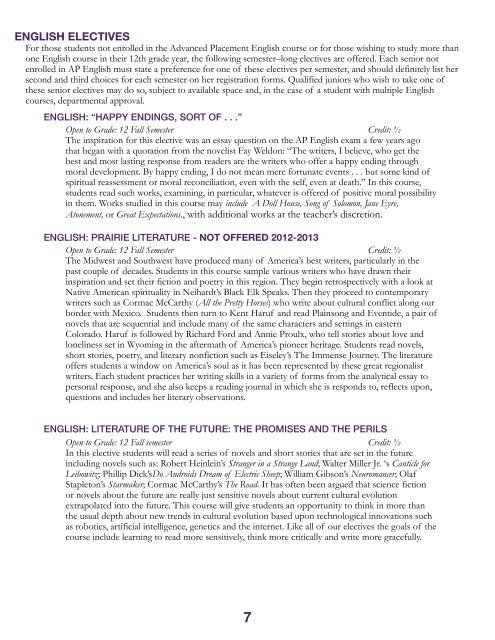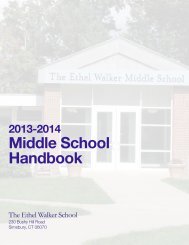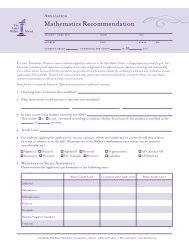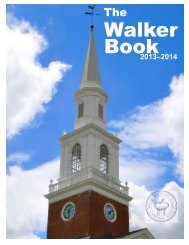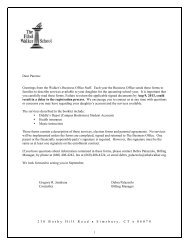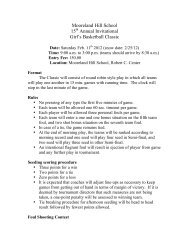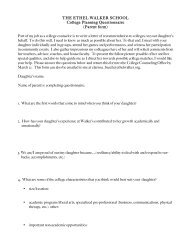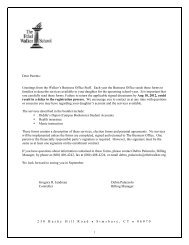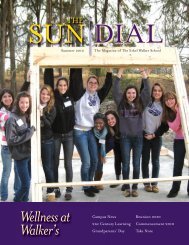CURRICULUM GUIDE 2012-2013 copy - The Ethel Walker School
CURRICULUM GUIDE 2012-2013 copy - The Ethel Walker School
CURRICULUM GUIDE 2012-2013 copy - The Ethel Walker School
Create successful ePaper yourself
Turn your PDF publications into a flip-book with our unique Google optimized e-Paper software.
ENGLISH ELECTIVESFor those students not enrolled in the Advanced Placement English course or for those wishing to study more thanone English course in their 12th grade year, the following semester–long electives are offered. Each senior notenrolled in AP English must state a preference for one of these electives per semester, and should definitely list hersecond and third choices for each semester on her registration forms. Qualified juniors who wish to take one ofthese senior electives may do so, subject to available space and, in the case of a student with multiple Englishcourses, departmental approval.ENGLISH: “HAPPY ENDINGS, SORT OF . . .”Open to Grade: 12 Fall SemesterCredit: ½<strong>The</strong> inspiration for this elective was an essay question on the AP English exam a few years agothat began with a quotation from the novelist Fay Weldon: “<strong>The</strong> writers, I believe, who get thebest and most lasting response from readers are the writers who offer a happy ending throughmoral development. By happy ending, I do not mean mere fortunate events . . . but some kind ofspiritual reassessment or moral reconciliation, even with the self, even at death.” In this course,students read such works, examining, in particular, whatever is offered of positive moral possibilityin them. Works studied in this course may include A Doll House, Song of Solomon, Jane Eyre,Atonement, or Great Expectations., with additional works at the teacher’s discretion.ENGLISH: PRAIRIE LITERATURE - NOT OFFERED <strong>2012</strong>-<strong>2013</strong>Open to Grade: 12 Fall SemesterCredit: ½<strong>The</strong> Midwest and Southwest have produced many of America’s best writers, particularly in thepast couple of decades. Students in this course sample various writers who have drawn theirinspiration and set their fiction and poetry in this region. <strong>The</strong>y begin retrospectively with a look atNative American spirituality in Neihardt’s Black Elk Speaks. <strong>The</strong>n they proceed to contemporarywriters such as Cormac McCarthy (All the Pretty Horses) who write about cultural conflict along ourborder with Mexico. Students then turn to Kent Haruf and read Plainsong and Eventide, a pair ofnovels that are sequential and include many of the same characters and settings in easternColorado. Haruf is followed by Richard Ford and Annie Proulx, who tell stories about love andloneliness set in Wyoming in the aftermath of America’s pioneer heritage. Students read novels,short stories, poetry, and literary nonfiction such as Eiseley’s <strong>The</strong> Immense Journey. <strong>The</strong> literatureoffers students a window on America’s soul as it has been represented by these great regionalistwriters. Each student practices her writing skills in a variety of forms from the analytical essay topersonal response, and she also keeps a reading journal in which she is responds to, reflects upon,questions and includes her literary observations.ENGLISH: LITERATURE OF THE FUTURE: THE PROMISES AND THE PERILSOpen to Grade: 12 Fall semesterCredit: ½In this elective students will read a series of novels and short stories that are set in the futureincluding novels such as: Robert Heinlein’s Stranger in a Strange Land; Walter Miller Jr. ‘s Canticle forLeibowitz; Phillip Dick’sDo Androids Dream of Electric Sheep; William Gibson’s Neuromancer; OlafStapleton’s Starmaker; Cormac McCarthy’s <strong>The</strong> Road. It has often been argued that science fictionor novels about the future are really just sensitive novels about current cultural evolutionextrapolated into the future. This course will give students an opportunity to think in more thanthe usual depth about new trends in cultural evolution based upon technological innovations suchas robotics, artificial intelligence, genetics and the internet. Like all of our electives the goals of thecourse include learning to read more sensitively, think more critically and write more gracefully.7


